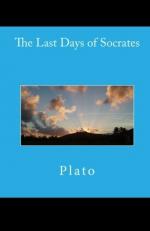
|
| Name: _________________________ | Period: ___________________ |
This test consists of 15 multiple choice questions and 5 short answer questions.
Multiple Choice Questions
1. What were Socrates and Euthyphro attempting to use as a measure to determine the morality of Euthyphro's decision?
(a) The relationships in Euthyphro's family.
(b) The laws of Athens.
(c) The unspoken code of conduct by which most Athenians abide.
(d) The approval of the gods.
2. What is the purpose of the notes in Book 1, Chapter 1?
(a) To provide extra information for those who are interested.
(b) To provide anecdotes that make the text more interesting.
(c) To help put the information into context.
(d) To help readers understand difficult words.
3. How did Grecian authors use Socrates' character?
(a) They used him to represent the concept of knowledge.
(b) They used his name for characters who expressed ideas, which had no real ties to the actual Socrates.
(c) They didn't, because they disliked him.
(d) They wrote biographies of Socrates, which are more or less accurate.
4. Who represented Socrates at his trial?
(a) Plato.
(b) He represented himself.
(c) Xenophenes.
(d) Euthyphro.
5. What does "apology" mean, in the context of the dialogue of that name?
(a) The same as its modern definition.
(b) A plea to the jury for forgiveness.
(c) Socrates' entire defense at his trial.
(d) An explanation for one's behavior.
6. What evidence did the Athenian authorities use to accuse Socrates of blasphemy?
(a) He was overheard questioning an Oracle about her faith.
(b) It was rumored that he had a "daemon", or an inner voice that was supposedly of divine origin.
(c) He wrote a dissertation on the effectiveness of prayer based on responses he received to his inquiries.
(d) He openly praised gods other than the Athenian deities.
7. What was unsettling, to Socrates, about the conversation he had with Euthyphro?
(a) Euthyphro did not seem to care about Socrates' point of view.
(b) Socrates knew that Euthyphro was going to go ahead with his prosecution, even though Socrates believed it was immoral.
(c) He realized there was no way to know for sure what the gods wanted.
(d) There were some portions of Euthyphro's argument that Socrates had difficulty understanding.
8. What is the first of the four dialogues contained in "The Last Days of Socrates"?
(a) The Apology.
(b) The Euthyphro.
(c) The Crito.
(d) The Phaedo.
9. Why was Socrates involved in political conflict?
(a) He wanted to be involved in politics, but wasn't educated enough.
(b) He proved the ignorance of a politically important person.
(c) His beliefs were not widely accepted.
(d) He manipulated politicians into conflicts with one another.
10. Who went to see the Apollonian Oracle at Delphi?
(a) Plato.
(b) Xenophenes.
(c) Chearephon.
(d) Socrates.
11. According to the conversation between Euthyphro and Socrates, what was the relationship between deities and mortals?
(a) Men were at the mercy of the gods.
(b) The gods would not exist without men.
(c) The gods and mortals had a mutual relationship.
(d) The gods need men to give them a purpose.
12. What did Socrates learn as a result of his dialogue with Euthyphro?
(a) He knew how to evaluate the holiness of his own actions, but not those of others.
(b) He didn't know what was holy or how to determine what was holy.
(c) He was more intelligent than Euthyphro and couldn't learn anything from him.
(d) It was impossible to convince someone that their actions were immoral or unethical if they felt that they were doing the right thing.
13. What was Socrates' objection to Euthyphro prosecuting his relative?
(a) Euthyphro was known to have committed some minor crimes himself, and no one in his family prosecuted him for it.
(b) Loyalty to family should come before loyalty to the law.
(c) Euthyphro didn't know all of the circumstances surrounding the crime.
(d) Euthyphro had no way to be sure he was prosecuting the right person.
14. What celestial body is associated with Artemis?
(a) Neptune.
(b) The moon.
(c) The sun.
(d) Pluto.
15. Why are the Socratic dialogues still studied, according to Tarrant?
(a) They must be mastered before other important material from the same time period can be studied.
(b) The information contained in the dialogues is still relevant.
(c) They are challenging for students to comprehend.
(d) Because scholars still don't completely understand them.
Short Answer Questions
1. Socrates claimed that he was questioning Euthyphro for what reason?
2. Who was Xenophon?
3. What is "Memorabilia"?
4. The victim of the crime committed by Euthyphro's relative had committed what crime himself?
5. Thrasyllus was a scholar from what century?
|
This section contains 767 words (approx. 3 pages at 300 words per page) |

|




